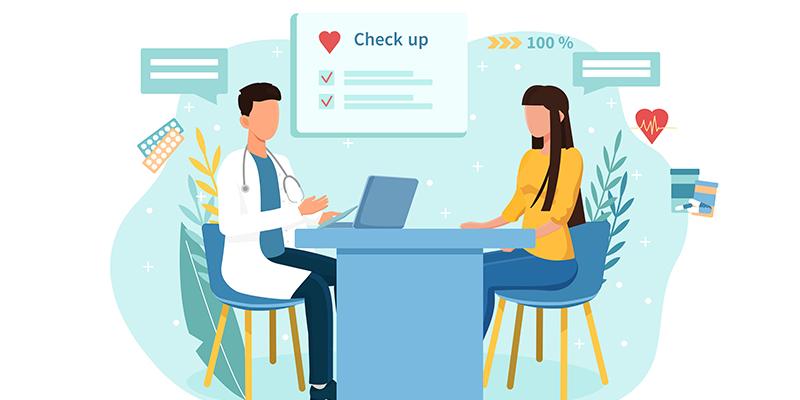“Time and health are two precious assets that we don’t recognize and appreciate until they have been depleted.“
Denis Waitley
Regular health checkups are a cornerstone of preventive healthcare, playing a vital role in maintaining your overall well-being. In this informative article, we’ll delve into the significance of scheduling routine health checkups, the benefits they offer, and how they empower you to take control of your health
The Power of Preventive Healthcare
Preventive healthcare is about staying ahead of potential health issues through early detection and proactive measures. Regular health checkups are a fundamental aspect of this approach, allowing healthcare professionals to monitor your health and address concerns before they escalate.
Regular Health Checkups: Key Benefits
Maintaining good health goes beyond just addressing illnesses when they arise. Regular health checkups play a crucial role in preventive healthcare and overall well-being. Here are some key benefits that highlight the importance of scheduling and attending routine health checkups:
1. Early Detection of Health Issues:
One of the most significant advantages of regular health checkups is the potential to catch health issues at an early stage. Many diseases, including serious conditions like cancer and cardiovascular diseases, are more manageable and have better treatment outcomes when detected early. Routine screenings and tests can identify potential problems before they become symptomatic or more challenging to treat.
2. Preventive Measures:
Health checkups allow healthcare professionals to assess your risk factors and provide personalized advice on preventive measures. This might include lifestyle changes, vaccinations, and screenings tailored to your health profile. By acting on this advice, you can proactively reduce your risk of developing certain diseases.
3. Improved Long-Term Health:
Regular health checkups contribute to maintaining good long-term health. When you actively engage in preventive care, you are taking steps to ensure that your body remains in optimal condition as you age. By detecting and managing health issues early on, you increase your chances of enjoying a higher quality of life as you grow older.
4. Peace of Mind:
Knowing that you are regularly monitored by healthcare professionals can provide peace of mind. It reduces anxiety about potential health issues and empowers you to take control of your health. Early detection and timely interventions can alleviate worry and uncertainty.
5. Cost Savings:
Preventive care is often more cost-effective than treating advanced illnesses. Detecting and managing health problems early can help you avoid more extensive medical interventions and hospitalizations, which can be financially burdensome. Investing in routine health checkups can save you money in the long run.
6. Personalized Health Plans:
Health checkups enable healthcare providers to create personalized health plans based on your individual needs, medical history, and risk factors. These plans can include recommendations for diet, exercise, and lifestyle modifications that can significantly impact your overall health.
7. Establishing a Health Baseline:
Regular health checkups provide a baseline for tracking changes in your health over time. This helps healthcare professionals identify trends and potential areas of concern. By having a consistent record of your health metrics, they can make more informed decisions about your care.
8. Health Education:
During health checkups, you have the opportunity to discuss your health concerns and receive valuable education about maintaining a healthy lifestyle. Healthcare providers can address your questions, offer guidance, and clarify misconceptions, empowering you to make informed choices about your well-being.
9. Promoting Healthy Habits:
Regular health checkups can serve as reminders to prioritize your health. Knowing that you have upcoming appointments may motivate you to adopt healthier habits such as regular exercise, balanced nutrition, and stress management.
10. Building a Strong Patient-Doctor Relationship:
Frequent interactions with healthcare providers through health checkups foster a strong patient-doctor relationship. This rapport enhances communication, trust, and collaboration in managing your health effectively.
In conclusion, regular health checkups are an investment in your well-being that offers a multitude of benefits, from early disease detection to cost savings and improved long-term health. By taking a proactive approach to your health through routine checkups, you can enjoy a higher quality of life and reduce the risk of future health complications.
What to Expect During a Health Checkup
A health checkup is an essential component of preventive healthcare, providing a comprehensive assessment of your well-being and helping you stay on top of your health. Knowing what to expect during a health checkup can alleviate any apprehensions and empower you to make the most of this proactive approach to maintaining your health. Here’s a step-by-step guide to help you understand what typically happens during a health checkup:
1. Appointment Scheduling:
Before your health checkup, you’ll need to schedule an appointment with your healthcare provider. The frequency of these checkups can vary depending on your age, medical history, and risk factors. It’s a good idea to discuss your health concerns and goals with your provider to determine the appropriate frequency for your checkups.
2. Preparation:
Some health checkups may require specific preparation, such as fasting before certain blood tests. Your healthcare provider will provide you with instructions on any necessary preparations to ensure accurate test results.
3. Review of Medical History:
At the start of your checkup, your healthcare provider will review your medical history. This includes discussions about any past illnesses, surgeries, medications you’re currently taking, allergies, and family medical history. Sharing accurate and detailed information is crucial for an accurate assessment.
4. Vital Signs Assessment:
Your vital signs will be measured, including your blood pressure, heart rate, respiratory rate, and body temperature. These measurements provide valuable information about your overall health and help identify any abnormalities.
5. Physical Examination:
A comprehensive physical examination is conducted to assess your overall health. Your healthcare provider will examine various body systems, including the heart, lungs, abdomen, skin, eyes, ears, and throat. This examination helps identify any signs of underlying health issues.
6. Laboratory Tests:
Depending on your age, risk factors, and medical history, your healthcare provider may order laboratory tests. These can include blood tests to measure cholesterol levels, blood sugar levels, kidney function, liver function, and more. Urine tests may also be conducted to assess kidney function and detect potential infections.
7. Health Risk Assessment:
Your healthcare provider may discuss lifestyle factors that can impact your health, such as diet, exercise, stress levels, and tobacco or alcohol use. This assessment helps identify areas where you can make positive changes to improve your overall well-being.
8. Screenings and Immunizations:
Health checkups often include screenings for conditions such as cancer, diabetes, and heart disease. Your healthcare provider may also recommend immunizations based on your age and medical history to protect you from preventable diseases.
9. Discussion and Guidance:
Your healthcare provider will review the results of your assessments and tests with you. They will explain any findings, address your concerns, and provide guidance on maintaining or improving your health. This is also an opportunity to ask questions and seek clarification on any health-related matters.
10. Healthcare Plan:
Based on the results of your health checkup, your healthcare provider will work with you to develop a personalized healthcare plan. This plan may include recommendations for lifestyle changes, medications, and follow-up appointments.
11. Follow-Up:
Your healthcare provider will discuss the recommended frequency for your next health checkup based on your individual needs and the results of your current checkup.
12. Documentation:
Your health checkup results will be documented in your medical records, serving as a reference for future appointments and healthcare decisions.
Remember that the specifics of a health checkup can vary based on individual needs and the healthcare provider’s practices. Open communication with your healthcare provider is key to ensuring that your concerns are addressed and that you have a clear understanding of your health status.
By participating in regular health checkups, you’re taking a proactive step towards maintaining your health and preventing potential health issues. Empower yourself with knowledge and be an active partner in your healthcare journey.
Empowering Yourself Through Regular Checkups
- Knowledge is Power: Regular checkups provide insights into your health status, empowering you to make informed decisions.
- Healthy Habits: Recommendations from healthcare professionals guide you towards healthier habits and lifestyle changes.
- Proactive Approach: By addressing potential health issues early, you’re taking charge of your health journey.
Conclusion
Regular health checkups are not just appointments; they are investments in your well-being. Embrace the preventive healthcare approach and prioritize your health by scheduling routine checkups. Early detection, disease prevention, and personalized guidance can lead to a healthier, more fulfilling life. Consult your healthcare provider to establish a schedule that aligns with your individual health needs and goals.
Note: Always consult a healthcare professional for personalized advice regarding your health and medical checkups.
Remember, the content provided here is for informational purposes only and should not be considered medical advice. Always consult a healthcare professional for accurate guidance and diagnosis.
References
- American Heart Association. “The Importance of Regular Check-Ups.” https://www.heart.org/en/healthy-living/healthy-lifestyle/how-to-help-prevent-heart-disease/the-importance-of-regular-check-ups
- Mayo Clinic. “Health checkup: An overview of routine exams.” https://www.mayoclinic.org/tests-procedures/health-checkup/about/pac-20384639
- Cleveland Clinic. “Annual Physical Exams: What to Expect.” https://health.clevelandclinic.org/what-happens-at-an-annual-physical/

